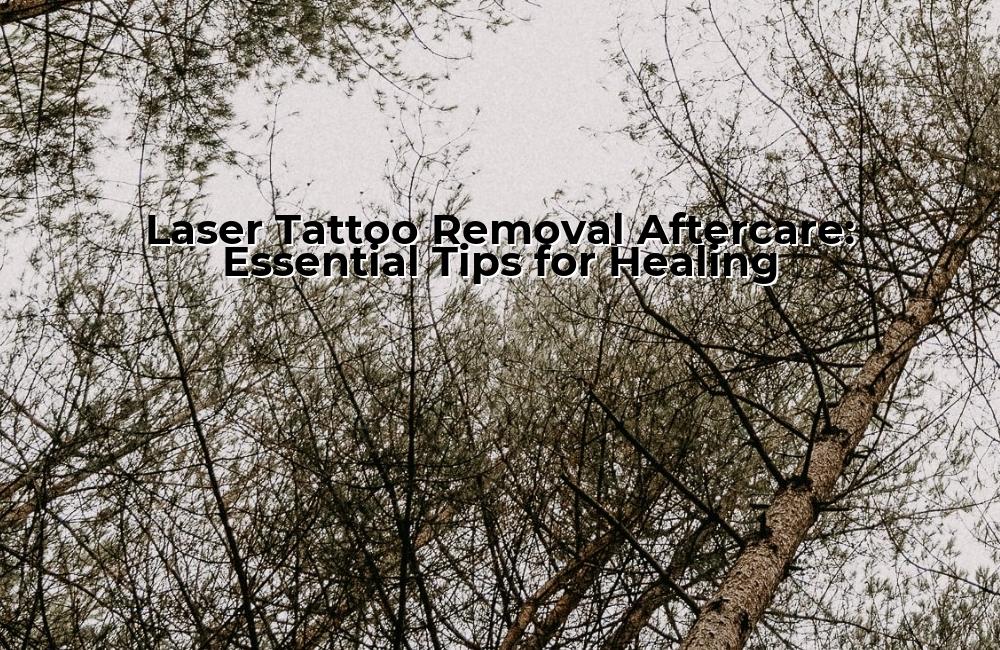Laser Tattoo Removal Aftercare: Essential Tips for Healing
Now that you’ve begun your tattoo laser removal treatments, how can you best care for the tattoo to reduce discomfort or potential side effects? With laser tattoo removal, like any type of procedure, it is possible to experience several minimal discomforts to the area after receiving treatment.
Laser removal works by using a laser to target the tattoo. The heat from the laser breaks apart tattoo pigment, which is then removed naturally by the body later. Because the skin is under direct contact by the laser, your skin could experience minor burns, blistering, itching, frosting and swelling. After a laser tattoo removal treatment, there is immediate whitening of the treated area, which typically lasts for several minutes. Many patients then develop blisters or scabs within 12-24 hours, which may last for 1-2 weeks or more. The treated areas may be pink or pale after the scab separates. Loss of skin pigment in the treated area is common and is usually temporary. Healing is usually complete within 6-8 weeks.

Undergoing laser tattoo removal is an effective way to eliminate unwanted tattoos, but proper aftercare is crucial to ensure a smooth healing process and optimal results. After your treatment, you may experience some discomfort and side effects due to the nature of the procedure. Understanding how to care for your skin will help minimize these effects and promote healing.
Understanding Laser Tattoo Removal
Laser tattoo removal involves using high-intensity light to target and break apart tattoo pigments embedded in the skin. This process causes immediate changes to the skin, including whitening, redness, and sometimes blistering. As the body naturally eliminates the broken-down ink, you might notice blisters or scabs forming within 12-24 hours post-treatment. These typically last for 1-2 weeks, and healing is usually complete within 6-8 weeks. It’s important to be aware that some loss of skin pigment in the treated area is common, though it is often temporary.
Immediate Aftercare Instructions
After your laser treatment, you may notice a phenomenon called "frosting," which occurs when rapid heating causes gas or plasma to form beneath the skin. This frosting will dissipate within minutes, but swelling and redness may persist. To alleviate discomfort, follow these steps:
- Cold Compress: Apply a cold compress to the treated area for the first 24 hours to reduce swelling and soothe the skin.
- Pain Relief: Over-the-counter pain relievers like Tylenol or Ibuprofen can help manage discomfort and inflammation. Avoid aspirin, as it may increase the risk of bruising and bleeding.
Keeping the Area Clean and Dry
Maintaining cleanliness is vital for preventing infection. Here are key steps:
- Dressing Care: Keep the dressing applied to the treatment area for 8 to 12 hours after the procedure.
- Cleansing: Clean the area gently with mild soap and water twice a day, patting it dry with a clean towel. Avoid scrubbing, which could irritate the skin.
Ointment Application
At MEDermis Laser Clinic, we recommend using an aftercare ointment like Calm and Correct by Dermamedics. This soothing serum should be applied twice daily for three days post-treatment. After the first dressing is removed, allow the area to breathe without a bandage.
Avoiding Complications
While blisters and scabs may develop as part of the healing process, it’s essential to avoid picking, peeling, or scratching the skin. If you do notice blisters, do not pop or pick at them. You may cover a blister with a dry dressing if needed. Should a blister ooze, apply a non-stick dressing and change it twice daily until drainage stops. A small amount of Neosporin can be applied to any damaged areas, but consult our office if discomfort persists.
Additional Care Guidelines
To ensure proper healing, consider the following precautions:
- No Shaving: Avoid shaving the treated area until it is fully healed.
- Limit Products: Do not apply makeup, medicated creams, or lotions to the area for 48 hours unless advised by our office.
- Avoid Water Activities: Refrain from swimming, hot tubs, or saunas until the skin is completely healed.
- Physical Activity: Limit exercise and strenuous activities for 2 to 7 days post-treatment to prevent excessive sweating and irritation.
Sun Protection
Protecting the treated area from sun exposure is crucial. Wear a broad-spectrum sunscreen with an SPF of 25 or higher for at least three months following your treatment. This will help prevent pigmentation changes and support healing.
When to Seek Help
Contact our office immediately if you experience any of the following:
- Signs of infection, such as honey-colored crusting, oozing, or spreading redness.
- Unusual discomfort or excessive bleeding.
- Moderate to severe itching in the treated area or surrounding skin.
- Any other concerning symptoms.
For extreme reactions, such as facial swelling, a rash, or difficulty breathing, seek emergency medical assistance immediately.
Conclusion
Proper aftercare is essential following laser tattoo removal to promote healing and minimize discomfort. By adhering to these guidelines and maintaining open communication with your provider, you can navigate the healing process effectively. Remember, every individual’s healing journey is unique, so listen to your body and give it the care it needs for the best possible results.
Menu
Recommended for you

How to treat melasma with laser?

Does Laser Tattoo Removal Hurt? Pain Management Strategies

How Much is Full Body Laser Hair Removal? Discover with CIELLULU

Ciellulu wish you Happy Middle Autumn-Day 2024!
You may also like

CIELLULU Q-Switched ND:YAG Laser LIFFAN Q6
Pigment Removal & Tattoo Removal & Skin Rejuvenation
If you have any comments or good suggestions, please leave us a message. Later, our professional staff will contact you as soon as possible.
Copyright © 2024 CIELLULU Designed by gooeyun. | Privacy Policy • Terms and Conditions








